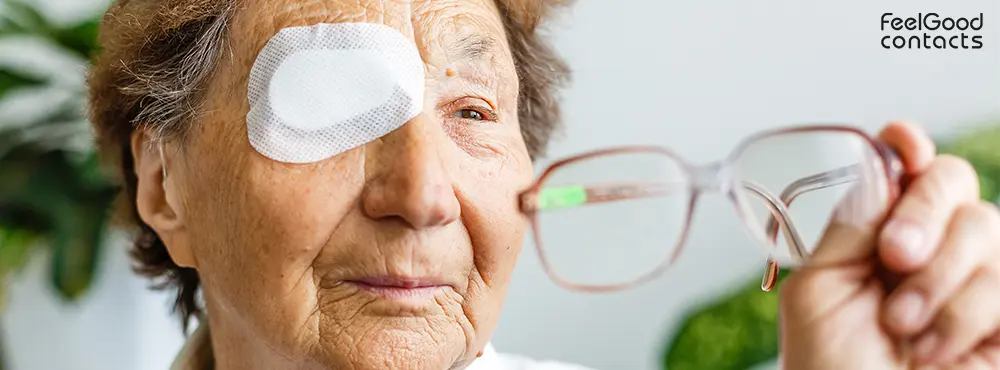Cataract surgery is a common and highly effective treatment for when vision is noticeably affected by the clouding of the natural lens inside your eye. This procedure, which involves removing your natural lens and then inserting a clear artificial one, has revolutionised modern medicine and allowed millions of people to regain their vision and improve their quality of life. However, despite the remarkable success of the surgery, we are not yet at a technological stage where artificial lens insertion will have the same focusing capabilities as someone younger than the age of 40. We cannot yet change the lens shape within the adult eye. What are the options, therefore, in terms of type of lens insertion? Are glasses still needed? If yes, what will be the best glasses after cataract surgery?
Best glasses after cataract surgery
The best suitable prescription glasses for you after cataract surgery depends on the type of intraocular lens (IOL) implanted. During the surgery, the cloudy natural lens of the eye is removed and replaced with an artificial lens. Various types of IOLs are available, and the type used significantly affects the need for glasses after the surgery. Here is a breakdown of the most commonly used IOLs:
- Monofocal IOLs: These are the standard IOLs, correcting vision for either distance or near sightedness. Most commonly, they're set for distance vision, meaning you'll require reading glasses for near-vision tasks like reading or using a computer.
- Multifocal IOLs: These more expensive IOLs offer multiple focal points, aiming to correct both distance and near vision. For some patients, they find this an excellent compromise to the ‘ideal focussing IOL’ that would be analogous to a young natural lens which is not currently possible. However, some patients experience seeing multiple images causing confusion.
- Toric IOLs: Designed for patients with significant corneal astigmatism, these IOLs correct both cataracts and astigmatism.
By understanding the types of IOLs and their impact on glasses needs, you can consult with your doctor to choose the best option for your vision goals. Other considerations that need to be taken into account include the refractive prescription of the other eye. For example, if you are myopic (short sighted) and after surgery wish to aim for distance vision, there will be a difference in prescription between the operated eye and the unoperated short-sighted eye. This can cause confusion, even when the appropriate glasses prescription is given (anisometropia). To correct this the other eye may require cataract surgery matching the appropriate IOL power.
Once your eyes have fully adjusted and your vision is stable, your eye doctor will conduct a thorough and comprehensive eye examination to assess the current state of your eyesight. During this exam, your doctor will determine the appropriate glasses prescription that will help you achieve the best possible visual acuity.
Can I wear my old glasses post-cataract surgery?
After undergoing eye surgery, you could wear your old glasses - this will not harm your eyes. However, the prescription most likely will not be appropriate and cause more blurriness than without. it's always a good idea to consult with your eye doctor for personalised advice.
How soon can I get new glasses after my cataract surgery?
It is crucial to allow your eyes to heal entirely and your vision to stabilise completely before planning a new eye examination and investing in new glasses. After undergoing surgery, it takes approximately six weeks for the eyes to heal and adjust to their new state. During this recovery period, your doctor may suggest using temporary reading glasses to help you with close-up tasks if required. It is essential to follow your doctor's advice and allow your eyes to heal properly to ensure long-lasting vision improvement.
Beyond glasses: contact lenses after cataract surgery
While glasses are the most common option, contact lenses can also be a suitable alternative for some patients after cataract surgery. Consult with your optician, considering factors like dry eyes and overall eye health.
Taking care of your eyes post cataract surgery
Following your doctor's post-operative instructions is essential for optimal healing. This may include using prescribed eye drops, avoiding strenuous activities, and wearing protective eyewear as recommended. Here are some do’s and don’ts suggested by NHS that can help in taking proper care of your eyes after the surgery:
Do:
- Remember to wear an eye shield while washing your hair
- When going outside, sunglasses to protect your eyes
- Refrain from swimming for a period of 4 to 6 weeks
- Make sure to use eye drops according to the instructions given by your optician
- Use your eye shield, provided to you to wear after your surgery, at night for at least a week
- If you feel any pain, it's okay to take painkillers recommended by your doctor
Don’t:
- Rub your eyes
- Allow soap or shampoo to seep into your eyes
- Drive until you get a go-ahead from your optician
- Put on any eye makeup for at least 3-4 weeks
- Do any strenuous exercise
Disclaimer: The advice in this article is for informational purposes only and does not replace medical care or an in-person check-up. Please check with an eyecare professional before purchasing any products or remedies. For information on our article review process, please refer to our Editorial Policy.

 Offers
Offers Account
Account
 Favorite
Favorite
 Basket
Basket

 OFFERS
OFFERS
















